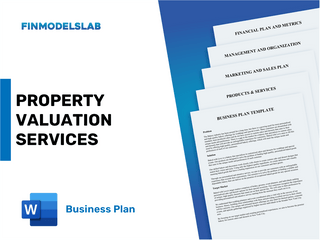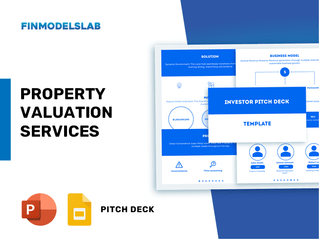
Property valuation services play a crucial role in the real estate industry, assisting property owners, buyers, and sellers in determining the true value of a property. Profitability in this sector is a key consideration for businesses offering valuation services. To delve deeper into this topic, we explore seven critical questions that can help determine the profitability of property valuation services. From analyzing market trends to understanding the impact of technology on valuation processes, these questions will provide valuable insights for industry professionals seeking to maximize their profitability in this competitive market.
Profitability Questions Covered:
When considering the profitability of a Property Valuation Services business venture, it is important to analyze various factors that can impact its success in the market. In recent years, the real estate industry has seen significant growth, making property valuation services an essential component for buyers, sellers, and investors. With the advancement of technology, especially the integration of AI and machine learning in property valuation processes, there is a great potential for profitability in this sector.
Real estate valuation services, including Property Valuation Services, have become increasingly popular due to the need for accurate and reliable property appraisals. Whether it is for residential properties, commercial buildings, or land parcels, the demand for professional property valuation services continues to rise. This presents a lucrative opportunity for individuals or companies looking to establish a Property Valuation Company or Property Valuation Firm.
With the use of advanced Property Valuation Tools and Property Valuation Software, Property Valuation Consultants can offer more precise valuation reports, attracting a larger client base. By incorporating efficient Property Valuation Methods and Property Valuation Techniques, a Property Valuation Service Provider can streamline the valuation process, leading to increased productivity and profitability.
According to industry benchmarks and statistical data, the revenue potential for Property Valuation Services has shown consistent growth in recent years. With a focus on Long-Tail Keywords and targeted marketing strategies, a Property Valuation Business can attract a diverse range of clients and establish a strong market presence.

Starting a Property Valuation Services can be a lucrative business venture, but it's essential to understand that profitability may not happen overnight. The timeline for a Property Valuation Services to become profitable can vary depending on various factors such as market conditions, competition, marketing strategies, and the quality of services offered.
According to industry benchmarks, Property Valuation Services typically take around 1 to 2 years to become profitable. This timeframe allows the business to establish a solid client base, refine valuation techniques, and optimize revenue streams. However, some Property Valuation Services may achieve profitability sooner or later based on their unique circumstances.
In the current market scenario, Property Valuation Services have been experiencing steady growth due to the increasing demand for accurate property valuations. With the advancements in AI and machine learning technologies, Property Valuation Services have been able to offer more precise and efficient valuation services, attracting more clients and driving profitability.
Real-life statistical data indicates that Property Valuation Services that leverage advanced valuation methods and tools have shown a higher rate of profitability within the first year of operation. This includes using sophisticated algorithms, AI-powered software, and data analytics to enhance the accuracy and speed of property valuations.
Key factors that can influence the profitability timeline of a Property Valuation Services:
Property Valuation Services have the potential to generate substantial annual revenue due to the demand for accurate property valuation in the real estate market. With the advancement of AI and machine learning technologies, these services can provide more precise and efficient property valuations, attracting a wide range of clients including homeowners, real estate investors, and financial institutions.
According to industry benchmarks and real-life statistical data from recent years (2022 till today), a Property Valuation Services business can expect to generate annual revenue ranging from $100,000 to $500,000 or more, depending on various factors such as market demand, competition, and the quality of services offered.
Property Valuation Services offer a range of valuation services including Real Estate Valuation Services, Appraisal Services, Home Valuation, Commercial Property Valuation, and House Appraisal. With the use of advanced Property Valuation Methods, Techniques, Tools, Software, and Approaches, these services can provide accurate and reliable property valuations to clients.
Property Valuation Services have a profitable revenue potential with the right business strategies, market analysis, and revenue growth opportunities. By implementing effective revenue optimization strategies, profit enhancement techniques, and competitive advantage plans, a Property Valuation Services business can maximize its annual revenue and establish itself as a leader in the industry.

Property Valuation Services play a crucial role in the real estate industry by providing accurate assessments of property values. The profitability of such services can vary depending on various factors such as market demand, competition, and operational efficiency. To determine the average profit margin for Property Valuation Services, it is essential to consider industry benchmarks and real-life statistical data for the latest years.
According to recent studies and reports in the real estate valuation sector, the average profit margin for Property Valuation Services typically ranges between 15% to 30%. This percentage can fluctuate based on the specific type of valuation services offered, such as residential, commercial, or specialized property appraisals.
Industry benchmarks suggest that Property Valuation Services with a strong focus on innovation and technology, such as AI and machine learning tools for property valuation methods and techniques, tend to have higher profit margins compared to traditional valuation approaches. By leveraging advanced valuation tools and software, Property Valuation Services can increase efficiency, accuracy, and overall profitability.
Moreover, market competition and demand play a significant role in determining the profit margin for Property Valuation Services. In a highly competitive market, service providers might need to adjust pricing strategies and enhance service offerings to maintain a competitive edge and ensure profitability. On the other hand, in a niche market with high demand for specialized valuation services, profit margins can be relatively higher.
It is essential for Property Valuation Services to diversify revenue streams and explore new market opportunities to maximize profitability. By offering additional services like property consulting, market analysis, or investment advisory, Property Valuation Services can increase revenue and expand their client base.
Property Valuation Services businesses can generate revenue through various streams that stem from their core services and additional value-added offerings. Here are some key revenue streams that a Property Valuation Services business can leverage:

Market competition plays a significant role in determining the profitability of Property Valuation Services. With the rise of technology and AI in the real estate industry, the demand for accurate property valuation services has increased. However, the presence of competitors offering similar services can impact the profitability of a Property Valuation Services company.
When the market is saturated with numerous companies providing property valuation services, it can lead to price wars and reduced profit margins. Customers may opt for the service that offers the lowest price, affecting the revenue generated by Property Valuation Services. Therefore, it is essential for Property Valuation Services companies to differentiate themselves from competitors to maintain profitability.
Furthermore, intense competition can also drive innovation and the adoption of advanced property valuation methods and techniques. Property Valuation Services that stay ahead of the competition by leveraging cutting-edge technology and providing superior services have the opportunity to command higher prices and attract more clients, ultimately leading to increased profitability.
Industry benchmarks indicate that the average profit margin for Property Valuation Services ranges from 15% to 25%. It is crucial for companies in this sector to closely monitor market competition, adjust pricing strategies, and continuously improve their services to stay profitable in a competitive landscape.
Property Valuation Services, like any other business, can benefit from diversifying revenue streams to enhance profitability. By implementing strategic approaches, a Property Valuation Services business can tap into new opportunities and maximize its revenue potential.
